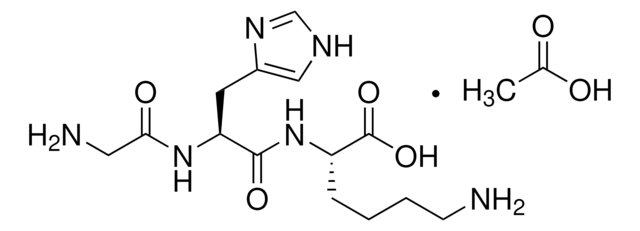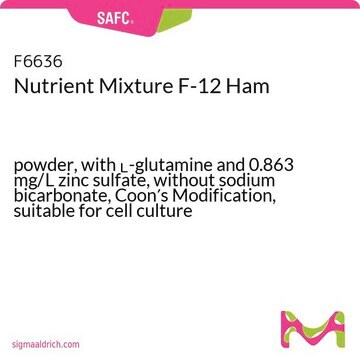G7387
Gly-His-Lys acetate salt
BioXtra, γ-irradiated, suitable for cell culture
Synonym(s):
Liver cell growth factor
About This Item
Recommended Products
biological source
synthetic (organic)
Quality Level
sterility
γ-irradiated
product line
BioXtra
form
powder
mol wt
400.43 g/mol
packaging
pkg of 5 mg
technique(s)
cell culture | mammalian: suitable
impurities
<2 EU/mL
color
white
solubility
H2O: soluble 0.5 mg/mL, clear, colorless
storage temp.
−20°C
SMILES string
CC(O)=O.NCCCC[C@H](NC(=O)[C@H](Cc1c[nH]cn1)NC(=O)CN)C(O)=O
InChI
1S/C14H24N6O4.C2H4O2/c15-4-2-1-3-10(14(23)24)20-13(22)11(19-12(21)6-16)5-9-7-17-8-18-9;1-2(3)4/h7-8,10-11H,1-6,15-16H2,(H,17,18)(H,19,21)(H,20,22)(H,23,24);1H3,(H,3,4)/t10-,11-;/m0./s1
InChI key
MGNUTAFMLGJBGV-ACMTZBLWSA-N
Looking for similar products? Visit Product Comparison Guide
Amino Acid Sequence
Application
- as a component of the serum-containing medium to culture human thyroid cells
- as a supplement to culture fisher rat thyroid cells
- as a component of the Dulbecco′s modified Eagle Medium (DMEM)/HamF12/mesenchymal stem cell media to culture mesenchymal stem cells
Storage Class Code
11 - Combustible Solids
WGK
WGK 3
Flash Point(F)
Not applicable
Flash Point(C)
Not applicable
Certificates of Analysis (COA)
Search for Certificates of Analysis (COA) by entering the products Lot/Batch Number. Lot and Batch Numbers can be found on a product’s label following the words ‘Lot’ or ‘Batch’.
Already Own This Product?
Find documentation for the products that you have recently purchased in the Document Library.
Customers Also Viewed
Our team of scientists has experience in all areas of research including Life Science, Material Science, Chemical Synthesis, Chromatography, Analytical and many others.
Contact Technical Service







